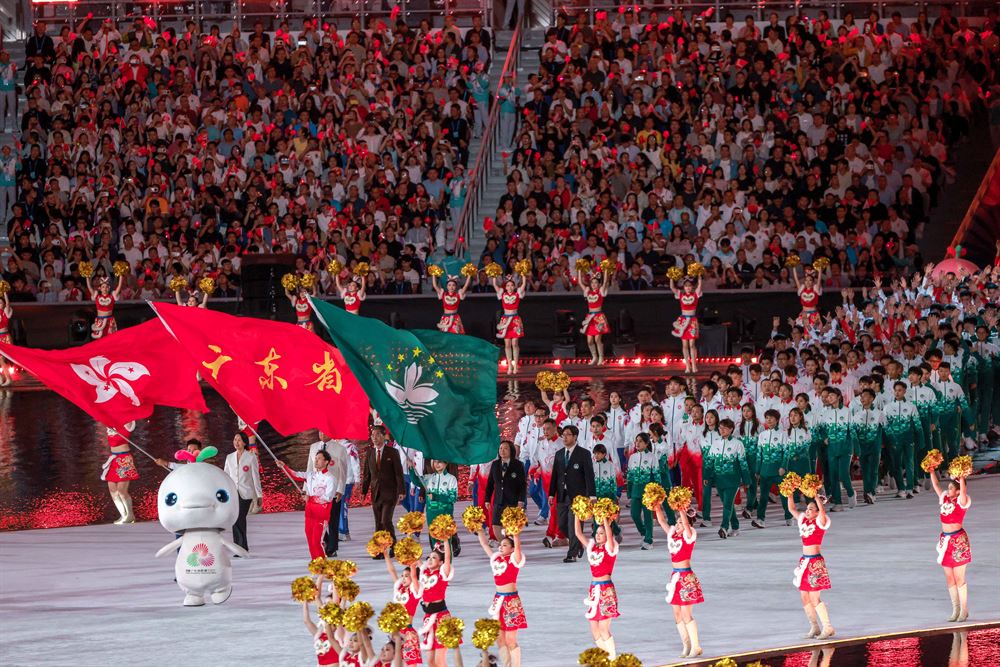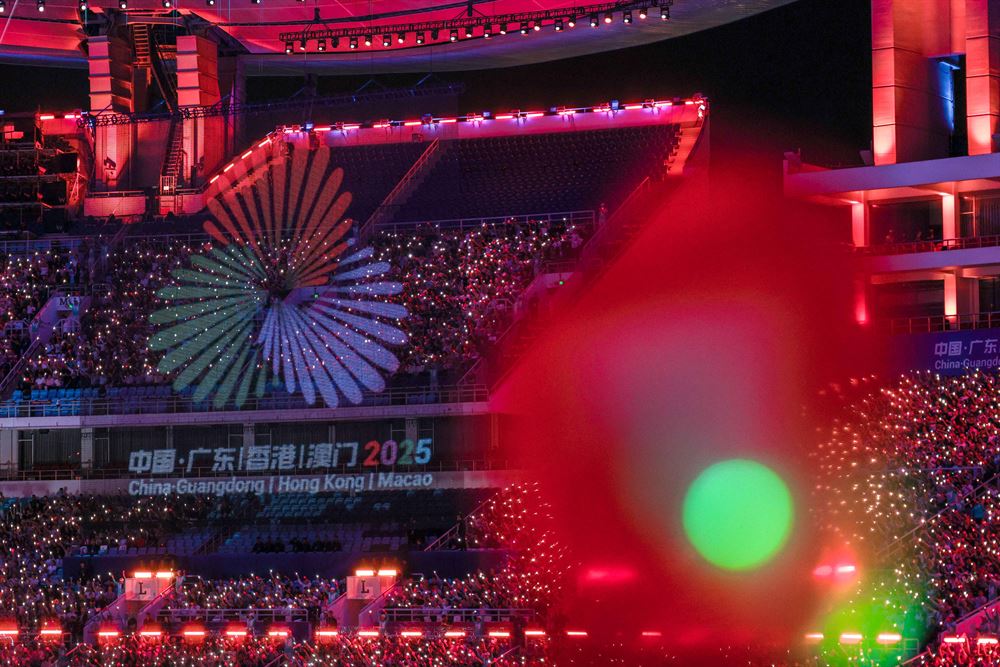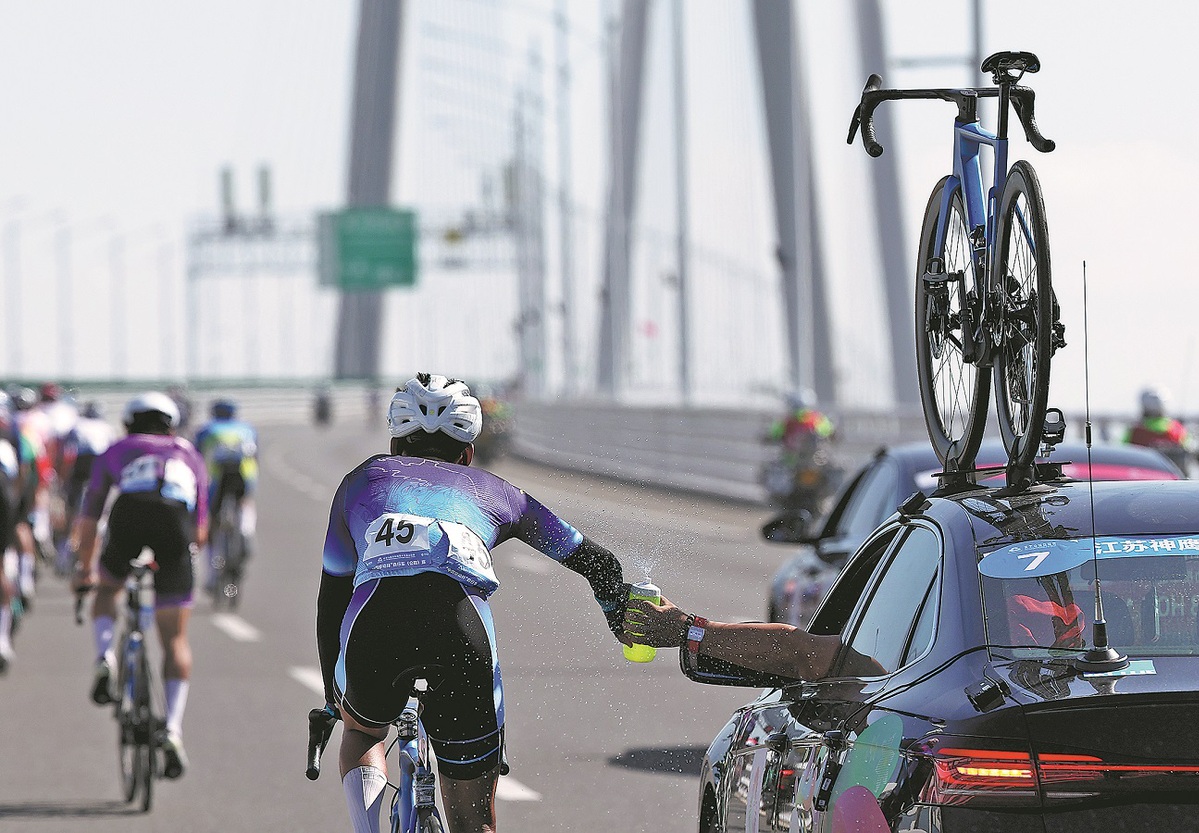
Move beyond the roar of the crowd for a moment and the most powerful sound at the 15th National Games might be the friendly banter on a shuttle bus or the shared anecdotes over a meal.
As the first-ever National Games co-hosted by Guangdong province and the Hong Kong and Macao special administrative regions captivate the nation, the most enduring victories are perhaps being forged not on the podium, but through personal connections — deeper bonds that are bringing Hong Kong and Macao closer to the Chinese mainland.
A tapestry of unity is being woven, thread by thread, as young athletes cross boundaries to compete, and volunteers welcome them with the full-hearted support of a hometown crowd.
Rico Cheung Siu-hang, 23, a 110-meter hurdler from Hong Kong, who is poised to make his National Games debut this year, said he is eager to engage with his peers from other provincial delegations for the exchange of technical expertise as much as for the shared sense of camaraderie.
When athletes from across the country gather for sports events, they not only share "trade secrets", but also stories about their hometowns, about the local delicacies and hidden travel gems, Cheung said, noting that such anecdotal exchanges happen mostly over meals.
"It's in these moments that our visceral links form," he said, adding that these organic, off-track interactions over the years have profoundly enriched his perspective of different parts of China, fostered a more nuanced understanding of the whole nation and strengthened his sense of national identity.
In preparation for the National Games, Cheung honed his skills in Shanghai this August under the guidance of Sun Haiping, who also coached China's hurdles race star and Olympic champion Liu Xiang.
Cheung arrived in Guangzhou, the provincial capital of Guangdong, with the rest of the Hong Kong athletics team on Wednesday, days ahead of his competition, which is scheduled at the Guangdong Olympic Sports Center on Nov 19.
The hurdler said he is particularly ecstatic about the "precious time window" he is getting, which is a departure from his usually tightly managed competition itineraries, and plans to use it for a leisurely visit to the city's landmark Canton Tower. The 600-meter-tall multipurpose tower is nicknamed "Slim Waist" for its unique twisted design.
ALSO READ: Historic National Games cycling race a testament to GBA integration
Big motivation
Hong Kong para-table tennis player Wong Yue-ching, who will compete in the 12th National Games for Persons with Disabilities in Guangzhou in December, said the anticipation of playing a match before a cheering home crowd offers special motivation.
"Competing on our doorstep means that friends and family members who've never seen me perform live can finally be in the stands," she said. "Having my biggest supporters witness the payoff of years of training would be a massive confidence boost for me."
Wong said she has noticed a groundswell of enthusiasm surrounding sports in Hong Kong in recent days, thanks to the city's role as a National Games co-host.
Promotional campaigns for the games have covered the city — from mass transit railway advertisements to prime-time television slots — and many of her peers are actively signing up as volunteers, she said.
"You can feel the buzz everywhere.... The games have clearly become more than just a sporting spectacle; it is like a citywide mobilization program, galvanizing substantial mass participation and drawing more passion for sports," she added.

Regional integration
The sentiment was echoed by those who have transitioned from competitor to contributor.
Former Hong Kong basketball player Leung Kwok-shing, who has been appointed as one of the SAR's volunteer ambassadors for the games, said he is experiencing the other side of the big-ticket games with a profound sense of duty and national pride.
The volunteer drive in the two special administrative regions has garnered enthusiastic public response, resulting in nearly 20,000 appointments — 16,000 in Hong Kong and 3,500 in Macao — according to the games' volunteer service department in the two cities.
Leung's motivation stems from his stint as a basketball player, during which he suffered injuries and received the care of volunteers. "I hope to switch roles and serve as a volunteer this time to contribute and give back," he said.
At a volunteer mobilization rally in Guangdong in October, Leung witnessed a powerful symbol of regional integration within the Guangdong-Hong Kong-Macao Greater Bay Area. A Hong Kong student currently pursuing studies at a Shenzhen university signed up as a volunteer for the Guangdong competition region.
ALSO READ: Greater Bay Area goes from bold blueprint to living reality
"This kind of exchange, where we unite as volunteers, truly fosters the integration of the Greater Bay Area," he said. "We are merging our services and our cultures, which is incredibly meaningful."
Leung also voiced his feeling of deep encouragement after seeing a great number of young people supporting the games and national development.
"I can feel the younger generation's eagerness to contribute to society and the country," he said. "This initiative is vital. I hope it spreads, helping to accelerate the growth of their national identity and sense of belonging."

Shared future
On the front lines of this integration are volunteers like Lai Meileng, a 32-year-old primary school teacher in Macao. For her, volunteering for the games is more than just a call of duty; it is a chance to be a welcoming host and a tiny "spark" in a blazing fire of community spirit, as well as a profound opportunity to connect more deeply with the nation.
As a member of the event's transportation coordination team, Lai's role involves shuttling athletes to competition venues, becoming a mobile platform for cultural and personal exchanges. "We aren't just ensuring transportation; we are building bridges," she said.
Lai recalled her recent interaction with mainland athletes on a shuttle bus. "I introduced them to Macao, and they shared their hopes and dreams for the games with me. Even though we are from different places, the distance didn't matter. We felt like friends," she said.
Such interactions form the very fabric of a stronger national identity, which allows Macao residents to understand their mainland compatriots better, Lai said.
Her perspective is also uniquely shaped by her dual role as an educator and a volunteer. She sees this experience as a vital tool for fostering national sentiment in the next generation.
"I can tell my students that the distance between us and the nation's affairs, or even famous athletes, isn't as far as they might think. It can plant a seed in their hearts, showing them that our future is a shared, hopeful one," Lai said.
While physical infrastructure, like the Hong Kong-Zhuhai-Macao Bridge, has long facilitated travel between Macao and the mainland, Lai said she believes that events such as the National Games have the power to build a more robust connection — a human one.
READ MORE: National Games start new chapter
"Previously, I might have thought national development was a distant matter. Now I see that I am intimately connected with the nation's development," she said.
"By fulfilling my own role well, I am contributing to the nation. When everyone plays their part well, the whole society improves," she added.


